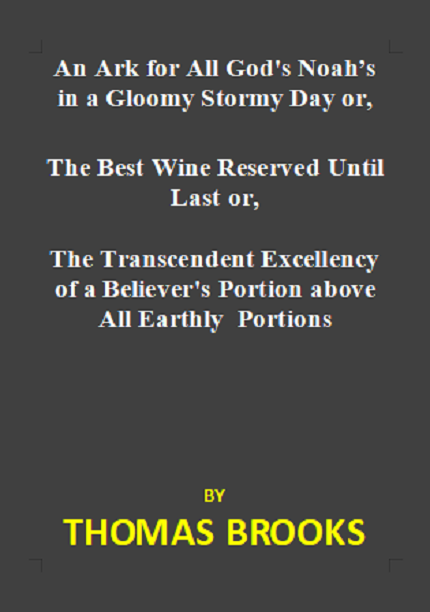By Thomas Brooks.

An Ark for All God’s Noah’s in a Gloomy Stormy Day, or,
The Best Wine Reserved until Last, or,
The Transcendent Excellency of a Believer’s Portion above all Earthy Portions.
By Thomas Brooks.
Introduction to the book:
A MATCHLESS PORTION” The Lord is my portion, says my soul; therefore I will hope in Him.” Lamentations 3:24.
Certainly if Ennius could pick out gold out of a dunghill, I may, by divine assistance, much better pick out golden matter out of such a golden mine as my text is—to enrich the souls of men.
The best of painters Apelles, to draw an exquisite Venus, had set before him an hundred choice and selected beauties, to take from one an eye, another a lip, a third a smile, a fourth an hand, and from each of them that special lineament in which the most excelled; but I have no need of any other scripture to be set before me to draw forth the excellency of the saints’ portion, than that which I have now pitched upon; for the beauty, excellency, and glory of a hundred choice scriptures are epitomized in this one!
The Jewish doctors and other writers differ about the time of Jeremiah’s penning this book of the Lamentations; but to be ignorant of the circumstance of time when this book was made, is such a crime as I suppose will not be charged upon anyman’s account in the great day of our Lord Jesus.
Doubtless this book of the Lamentations was composed by Jeremiah in the time of the Babylonian captivity. In this book the prophet sadly laments and bewails the grievous calamities and miseries that had befallen the Jews, namely—the ruin of their state, the devastation of their land, the destruction of their glorious city and temple, which was the great wonder of the world, the profanation of all his holy things, the contemptible and deplorable condition of all sorts, ranks, and degrees of men.
And then he complains of their sins as the procuring causes of all those calamities that God in his righteousness had inflicted upon them. He exhorts them also to patience under the mighty hand of God, and stirs them up to repent and reform, as they would have their sins pardoned, judgments removed, divine wrath pacified, their insulting enemies suppressed, and former acts and grants of favor and grace restored to them.
But to come to the words of my text, “The LORD is my portion, says my soul; therefore I will hope in Him.” Lamentations 3:24
The LORD Jehovah, from havah, he was. This name Jehovah is the most proper name of God, and it is never attributed to any but to God.
First, Jehovah sets out God’s eternity, in that it contains all times, future, present, and past.
Secondly, It sets out also God’s self-existence, coming from havah, to be.
Thirdly, When either some special mercy is promised, or some extraordinaryj udgment is threatened, then the name of Jehovah is commonly annexed; to show that that God whose being is from himself, and who gives a being to all his creatures both on heaven and on earth—will certainly give a being to his promises and threatenings, and not fail to accomplish the words that are gone out of his mouth.
Fourthly, This name Jehovah consists only of quiescent letters, that is letters of rest, as the Hebrews call them, to show that there is no rest until we come to Jehovah, and that in him we may safely and securely rest, as the dove did in Noah’s ark. “Is my portion.” the Hebrew word signifies to divide. He alludes, as I take it, to the dividing of the land of Canaan among the Israelites by lot.
“The Lord,” says he, “is my portion,” my part, my lot; and with this portion I rest fully satisfied, as theIsraelites were to do with their parts and portions in that pleasant land. It is true, says Jeremiah, in the name of the church, I am thus and thus afflicted, and sorely distressed on all hands; but yet “the Lord is my portion,” and that supports and bears up my spirits from fainting and sinking in this evil day. “Says my soul.”
The Hebrew word has nine various senses or significations in the Scripture. But let this suffice, that by soul here in the text we are to understand the heart, the mind, the spirit, and the understanding of a man. Well, says the prophet, though I am in a sea of sorrow, and in a gulf of misery, yet my heart tells me that “the Lord is my portion;” my mind tells me that “the Lord is my portion;” my spirit tells me that “the Lord is my portion;” and my understanding tells me that “the Lordis my portion;” and therefore I will bear up bravely in the face of all calamities and miseries. “Therefore will I hope in him.”
The Hebrew word that is here rendered hope, signifies both hoping, expecting, and trusting; also it signifies a patient waiting upon the Lord. [Gen 8:10; Isaiah 42:4; Psalm 31:25] The prophet Jeremiah had not only a witness above him—but also a witness within him, that the Lord was his portion; and therefore he resolves firmly to hope in the Lord, and sweetly to trust on the Lord, and quietly and patiently to wait upon the Lord, until God should turn his
storm into a calm, and his sad winter into a blessed summer.
In my text there are three things observable:
First, An assertion or proposition in those words, “The Lord is my portion.”
Secondly, A proof of it in those words, “says my soul.” Thirdly, The use or inference from the premises in those words, “Therefore will I hope in him.”